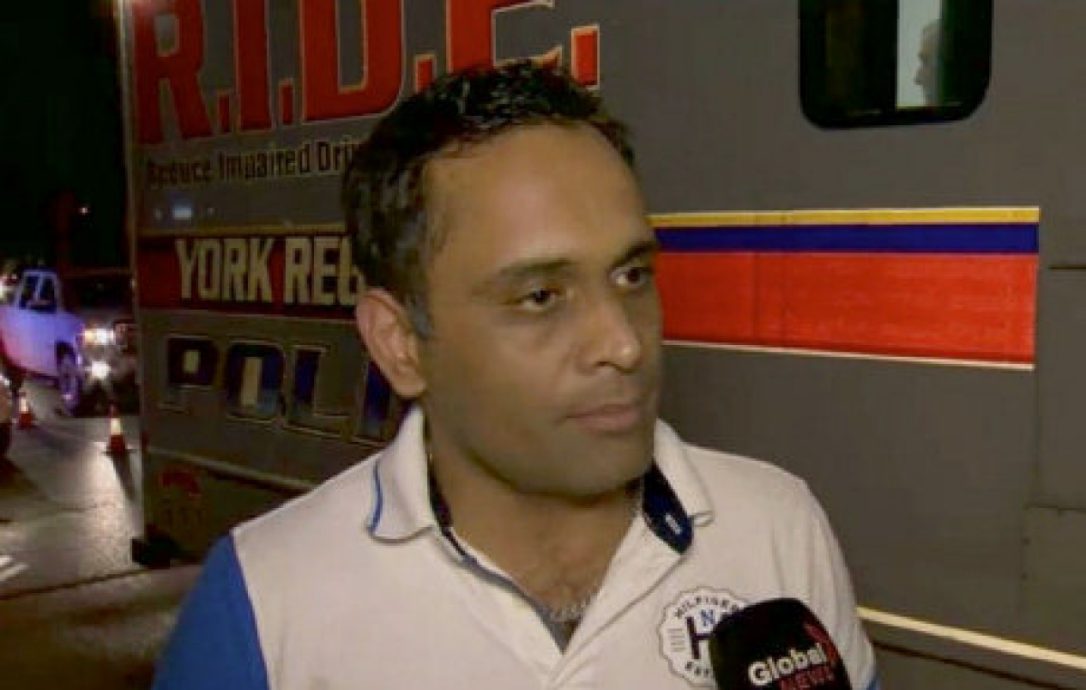The man’s charter rights were violated, including his right to counsel, a judge ruled.
A man was acquitted of a drunk driving charge after a Newmarket judge found his rights were violated when police allowed a TV camera operator to film him giving breath samples and speaking to a lawyer on the phone.
Ontario Court Judge David Rose wrote that there was no evidence to suggest York Regional Police placed any restrictions on a Global News TV crew on the night in question in 2016 after approving their presence at a RIDE check in Richmond Hill.
Concluded that Kunal Gautam’s rights to counsel and to be free from unreasonable search and seizure were infringed, Rose threw out the breath samples and acquitted him.
“What is regrettable in this case is that otherwise reliable evidence of blood alcohol content of a motorist is excluded because York Regional Police saw apparent wisdom in giving Global News access to the RIDE truck (where the breath samples were taken),” Rose wrote in a decision released last week.
“An effort to publicize a fairly routine police alcohol driving interdiction program will result in an acquittal. The irony is not lost on me.”
York Regional Police have often stated that the region has a serious problem with drinking and driving. It was something that was also raised by the Crown attorney in the hearing before Rose. Police reported there were more than 1,200 drunk driving incidents in 2016.

Kunal Gautam testified that while he spoke to a lawyer in the RIDE truck, a camera operator placed his camera at the window. (GLOBAL NEWS)
The issue was put front and centre when a drunken Marco Muzzo slammed into another vehicle in Vaughan and killed three children and their grandfather in 2015. He was sentenced to 10 years in prison in March 2016, about two months before Gautam was arrested.
Gautam had provided two breath samples showing results of 152 and 146 milligrams of alcohol in 100 millilitres of blood — nearly twice the legal limit.
The judge wrote that the rights violations were “particularly serious” because the order to allow Global News to film came from an unknown police official.
“What aggravates the seriousness of the charter violations in this case is that there appears to have been no input from the actual officers on scene about what might happen if a TV news crew were allowed inside the RIDE truck,” Rose wrote.
“The presence of Global News that night appears to have been an order ‘from on high.’ No witness personally took responsibility in the evidence to explain the rationale for Global TV being in the RIDE truck.”
A segment that aired in May 2016 shows Gautam being taken into the RIDE truck by police, providing breath samples and telling officers he had only one drink. He spoke briefly to a Global reporter afterward.
The segment caused him embarrassment at work and came as a surprise to some of the officers who worked the RIDE check that evening, Rose wrote in his ruling.
Pattenden, the police spokesperson, told the Star that the ride-along was set up by the corporate communications department to demonstrate how serious a problem drunk driving continues to be. He did not say who gave approval.
“The case that you specifically mentioned was dealt with by the courts and we respect the decision,” Pattenden wrote in an email. “Since that time, corporate communications has made changes in policy to ensure media is more closely supervised while on ride-alongs.”
A Global executive said in a brief statement to the Star that Global’s journalists are trained to balance the rights of accused persons with the public’s right to know.
“We operated in plain sight with police authorization, keeping as low a profile as the environment allowed,” said Ron Waksman, vice-president of digital and editorial standards and practices for Global News and Corus Radio.
Gautam testified that while he spoke to duty counsel — the free legal advice hotline — in a phone booth in the RIDE truck, the Global camera operator placed his camera at the window looking into the booth.
Rose wrote that he found Gautam’s testimony to be truthful, and that Gautam didn’t feel comfortable asking the lawyer questions because of the camera. His rights to counsel were therefore violated, the judge found.
He also concluded that his right to be free from unreasonable search and seizure had been infringed because he had a privacy interest while he was in the breath room area of the RIDE truck.
“Justice Rose did an excellent analysis and decided it was in the long-term best interests of justice to exclude the evidence,” said Gautam’s lawyer, Ken Anders.
Source: The Toronto Star
